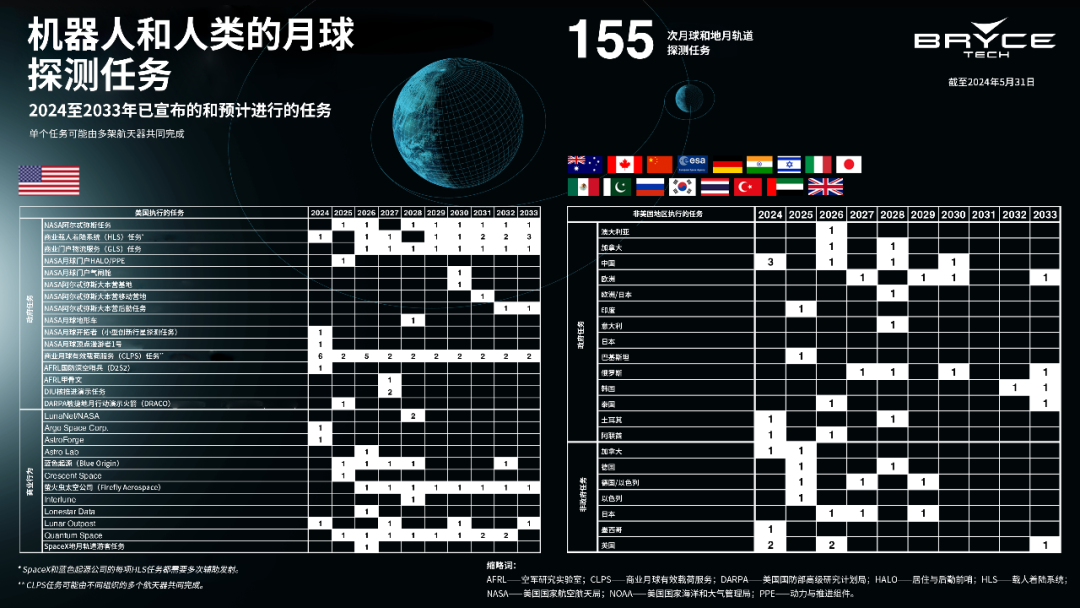In just the past decade, countries and organizations around the globe have already planned more than 30 lunar missions.
Image source:Reuters/Joe Skipper
Pascale Ehrenfreund
Chairperson of the Committee on Space Research (COSPAR)
Carissa Christensen
BryceTech CEO
Space exploration is at a transformative moment, marked by groundbreaking missions heading to the Moon, Mars, and even farther into the cosmos.
Public and private space exploration players are leveraging cost-effective, reusable launch vehicles to tackle ambitious missions, driving transformative change in the industry.
We need to ensure that our space activities safeguard the interests of future generations.
For the aerospace industry, this is an extraordinary and exhilarating era. We’re also at a transformative moment in space exploration, with everyone actively pursuing groundbreaking missions to the Moon, Mars, and even beyond.Government and commercial interests alike are driving technological advancements, significantly enhancing our understanding of the solar system. These public and private players in space exploration are leveraging cost-effective, reusable launch vehicles to tackle ambitious missions, sparking industry-wide transformation that’s making space exploration more accessible—and accelerating humanity’s journey into the cosmos.Space exploration also fosters international collaboration and inspires future generations of humanity. In the past, there have never been as many space missions venturing into the solar system as there are today.In recent months, humans have completed six lunar missions. India and Japan have become the fourth and fifth countries, respectively, to successfully achieve a "soft" landing on the Moon.China recently collected samples from the "far side" of the Moon for the first time. Additionally, with support from government and private funding, countries around the world plan to carry out more than 150 lunar and Earth-Moon orbit exploration missions by 2033.The Sustainability Challenges of Space ExplorationThe surge in space activities has also brought sustainability challenges. For the sake of humanity’s present and future, we must safeguard celestial resources—and act now.Global public and private entities are already gearing up for lunar and cislunar exploration missions over the next decade.
Image source:Brycetech
The primary goal of the deep-space exploration program is to establish a sustainable base on the Moon, laying the groundwork for humanity's future exploration of Mars. NASA’s Artemis program and the International Lunar Research Station (ILRS), jointly led by China and Russia, are pioneering initiatives in lunar exploration.Both alliances have unveiled the scientific goals and guidelines governing their respective exploration programs. The Artemis program aims to return astronauts to the Moon, with key missions including the crewed Artemis 2 flight in 2025 and the crewed lunar landing of Artemis 3 in 2026.Meanwhile, the ILRS plan aims to land Chinese astronauts and Russian cosmonauts on the Moon after 2030, and it has already secured cooperative agreements with multiple countries, garnering widespread support. These initiatives are globally significant and involve the interests of many stakeholders, making it essential for us to refocus on the complex infrastructure across various technological domains, as well as on planetary environmental management and the development of robust legal and collaborative frameworks.The Outer Space Treaty is the foundational pillar of multilateral space governance. Adopted in 1967, it is an international agreement governing the peaceful use and exploration of outer space, prohibiting the deployment of nuclear weapons in space and explicitly forbidding any nation from claiming sovereignty over celestial bodies.The 1979 Moon Agreement was designed to regulate nations' activities on the Moon, particularly those related to resource exploitation. However, although the treaty is binding international law for its 17 signatory countries, it has yet to be ratified by the very nations most likely to dominate space-resource activities in the years ahead.In 2019, the United Nations Committee on the Peaceful Uses of Outer Space (UNCOPOUS) adopted the "Guidelines for the Long-term Sustainability of Outer Space Activities," providing comprehensive guidance on policy, regulatory frameworks, safety, and international cooperation.Meanwhile, NASA's Artemis Accords are a set of non-binding principles designed to guide civilian space exploration and utilization in the 21st century. To date, NASA and space agencies from 43 countries have signed these agreements.Sustainability in space activities involves conducting operations in an environmentally friendly, economically viable, and socially responsible manner.For instance, some countries have outlined in their documents submitted to the UNCOPUOS Space Resources Working Group that the key lies in minimizing space debris, preventing contamination, and advancing responsible resource management technologies.Establishing an international framework for cooperation and security, while carefully considering the ethical and cultural issues involved as we expand into deep space, is absolutely essential.Involving diverse stakeholders and listening to all relevant "voices," including those of Indigenous communities, while raising public awareness, is also crucial for advancing sustainable and ethical practices in deep-space exploration.As space missions and infrastructure continue to advance, the regulatory framework for responsible celestial management—including resource utilization—must evolve accordingly. Growing concerns about sustainability have prompted space agencies, international space organizations, and expert groups to launch several initiatives aimed at developing guidelines and frameworks for responsible lunar and cislunar activities, as well as effective governance for space exploration.The 67th session of the United Nations Committee on the Peaceful Uses of Outer Space agreed to establish a Consultative Action Group on Lunar Activities, inviting countries worldwide to contribute their expertise to its work.The Space Futures Initiative of the Global Future Council on Space at the World Economic Forum recognizes that we urgently need a comprehensive sustainability framework to manage space exploration activities—while also addressing the ethical, cultural, and societal challenges they pose.Key advice for stakeholders in space exploration1. Establish a comprehensive space environment database:Develop a centralized and comprehensive database to collect, catalog, and systematically assess the environmental impacts associated with space activities. This database will be openly accessible to all stakeholders involved in space activities, as well as scientists, policymakers, and the public, ensuring transparency and fostering evidence-based decision-making. The database will also be regularly updated with the latest research findings and mission data.2. Aligning Global Space Stakeholders:Engage all stakeholders—ranging from space agencies and private companies to researchers and the public—in discussions about the environmental impact of space activities. Ensure that their concerns and needs are addressed, involve them in the decision-making process, and foster a more inclusive and effective governance framework.3. Promote the establishment of consensus on harmful pollution issues:Develop a comprehensive system that clearly defines and categorizes "harmful contamination" in space exploration—such as biological, physical, and chemical pollution that could impact celestial bodies and the space environment. Building this consensus will require collaboration among international space agencies, scientists, and regulatory bodies to agree on standardized criteria and threshold levels for contamination.4. Integrating scientific research into policy:Establish a robust mechanism to ensure that the latest scientific discoveries and advancements in space research are integrated into space exploration policies and regulations. This approach will help ensure that regulations are grounded in the best available evidence, enabling them to effectively address emerging challenges and seize new opportunities.5. Enhance transparency, build trust, and strengthen accountability:Advocating for transparency in all aspects of space exploration and environmental management—by encouraging open access to data, research findings, and mission details—can foster trust among stakeholders and the public, while also promoting collaboration and accountability.6. Coordinate the regulatory mechanism:Recognizing the reality of a multi-center governance approach, which involves multiple overlapping authorities and jurisdictions, it is essential to establish flexible, rapidly responsive coordination mechanisms that foster international cooperation and collaboration—while managing the environmental impact of space exploration. Key principles to be implemented include outcome-oriented rules, as well as context-specific guidelines capable of adapting to evolving circumstances and emerging information.7. Launch a public awareness campaign:Launch initiatives to space awareness. Implement educational programs to highlight the importance of deep-space exploration and celestial environment management. Leverage diverse media channels and social platforms to reach wider audiences, fostering greater public interest and support for sustainable space practices.As we continue exploring the solar system and returning to the Moon, we must also maintain a strong sense of responsibility—and move forward toward establishing a comprehensive operational governance system.We must ensure that our space activities safeguard the interests of future generations. This approach is not only critical for our successful exploration of the nearest celestial bodies but also essential for advancing humanity's long-term, in-depth exploration of the solar system.
The above content solely represents the author's personal views.This article is translated from the World Economic Forum's Agenda blog; the Chinese version is for reference purposes only.Feel free to share this on WeChat Moments; please leave a comment below the post if you’d like to republish.
Translated by: Sun Qian | Edited by: Wang Can
The World Economic Forum is an independent and neutral platform dedicated to bringing together diverse perspectives to discuss critical global, regional, and industry-specific issues.
Follow us on Weibo, WeChat Video Accounts, Douyin, and Xiaohongshu!
"World Economic Forum"






